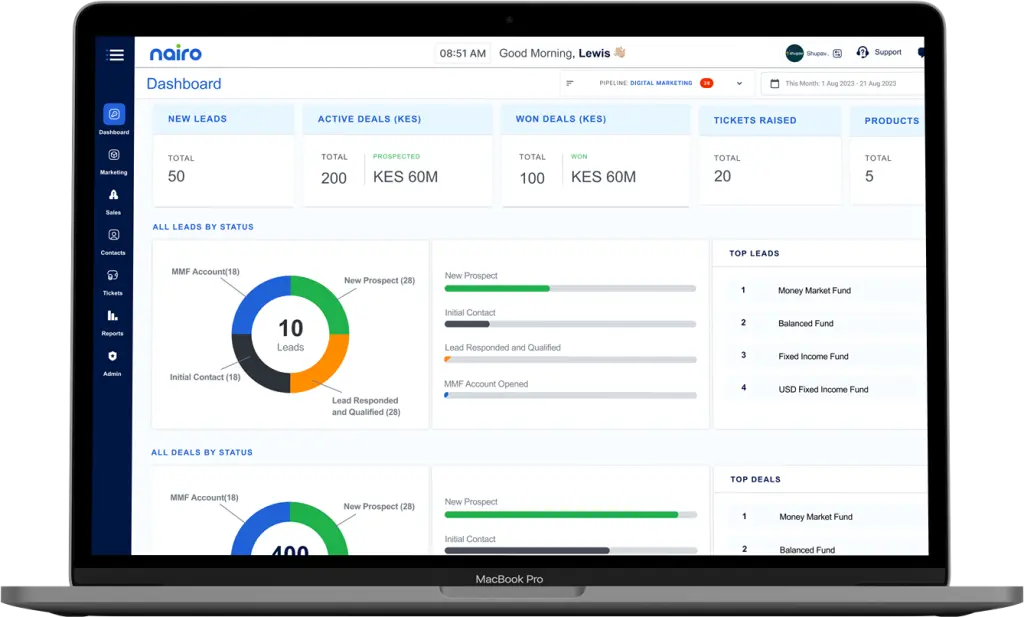Sales is often seen as an “always on” career – long hours, high pressure, constant hustling to hit targets. It’s no wonder that sales team burnout is real and on the rise. If you lead a sales-driven team, you might have noticed the signs: your once-energetic reps are feeling exhausted, demoralized, or overwhelmed by their workload. Burnout doesn’t just harm your employees; it hurts your business through lower productivity and higher staff turnover.
Here’s the good news: The right tools, especially a well-designed CRM, can significantly reduce burnout by making your salespeople’s jobs easier and more fulfilling. In this article, we’ll explore why sales teams burn out and how a Customer Relationship Management system can act as a safety net – streamlining work, reducing stress, and even boosting morale.
The Reality of Sales Burnout
Burnout is more common in sales than many realize. Recent studies have put alarming numbers on what many of us have felt anecdotally:
- High Stress Levels: Up to 90% of sales employees report feeling symptoms of burnout at some point. That means almost your entire team could be struggling under the surface.
- Overwhelming Workload: In one assessment, 57% of sales reps said their workload feels beyond their capacity – they simply have too much to do in a day.
- Always On Duty: 74% of reps feel like customers demand instant responses around the clock, making it hard to ever unplug.
- Long Hours: 67% of salespeople report working far longer than their official hours, often coming in early, staying late, or answering calls on weekends just to keep up.
- Impact on Wellbeing: About 60% say work-related mental health issues hinder their performance, and a shocking 73% are actively looking for other jobs to escape the stress. Burnout is driving valuable talent out the door.
These stats paint a clear picture: sales teams are burning the candle at both ends, and it’s unsustainable. High turnover in sales is often a direct result of burnout – people can only run at full speed for so long before they crash.
Why Salespeople Burn Out (The Hidden Culprits)
We know sales is a high-pressure field due to targets and competition. But much of the stress comes not just from selling, but from everything around selling:
- Administrative Overload: Sales reps often spend more time on data entry, updating spreadsheets, writing reports, and searching for information than they do engaging with customers. Amazingly, studies show reps spend only about 36% of their time actually selling – the rest is eaten up by non-selling tasks. All that “busy work” contributes to exhaustion and frustration, because it’s not what most salespeople signed up to do.
- Disorganization and Chaos: Without a good system, a salesperson’s day can feel chaotic. They might be tracking deals in a notebook, setting follow-up reminders on sticky notes, and digging through email threads to remember what was promised to whom. This disarray means things get missed, leading to last-minute scrambles (think: forgotten proposal deadlines, or a client calls and you have no idea who they are). Constantly firefighting due to disorganization is a recipe for burnout.
- Lack of Progress Visibility: Sales can be demoralizing if you can’t clearly see progress. If a rep isn’t sure where they stand relative to their quota, or they don’t have insight into which deals are likely to close, they operate in a cloud of uncertainty. Uncertainty breeds anxiety. It’s hard to feel motivated when you’re not sure if you’re winning or losing.
- Repetitive, Tedious Processes: From manually compiling weekly sales reports to sending the same follow-up email to 50 leads – repetitive tasks drain energy. Humans naturally find motivation in creative and strategic work, not mindless repetition. When talented salespeople are reduced to robot-like tasks, they disengage.
- Feeling Undervalued: A lot of burnout comes from feeling like one’s efforts aren’t yielding results or appreciation. If deals are falling through cracks or customer relationships sour because the tools and processes weren’t there to support the rep, they can feel a personal sense of failure. That’s hugely demotivating over time.
Now that we understand the problem, let’s talk about the solution. How can a CRM – often thought of as just a database – actually alleviate these pain points and save your sales team from burnout?
CRM to the Rescue: Making Work Manageable
Imagine taking a huge weight off your sales team’s shoulders – that’s what a well-implemented CRM can do. Here are several ways the right CRM can directly combat the causes of burnout:
1. Automating the Boring Stuff
One of the fastest paths to burnout is spending hours on tedious tasks. The right CRM dramatically cuts down the grunt work by automating repetitive activities:
- Data entry can be minimized by web forms feeding leads straight into the CRM, or email integration that logs customer communications automatically.
- Instead of typing the same follow-up email to every new lead, you can create a template once in the CRM and use it whenever needed, or even have it auto-send at preset intervals.
- Reports that used to take half a day to compile can be generated in seconds with real-time dashboards. No more late nights on Excel trying to tally up the week’s activities.
When you add this up, the time savings are huge. Sales reps free up hours that they can reinvest in talking to clients and closing deals (the fun, rewarding part of the job). They’ll feel less like data clerks and more like sales professionals. This not only improves results – it also makes their day-to-day work more engaging, which fights off burnout.
Consider this: a survey found salespeople believe they could increase revenue by 38% if they spent less time on non-selling tasks. Imagine the morale boost of hitting that higher number – simply by letting a CRM handle the drudgery, your team can focus on the work that actually brings in money (and commission).
2. Bringing Order to the Chaos
A good CRM serves as the organized hub for all sales activities. When your team starts their day, they shouldn’t have to wonder “what should I do today?” or frantically search for information. The CRM will present a clear to-do list: which leads to call, which deals need follow-ups, which customers have upcoming renewals, etc., all in one place.
This level of organization is liberating. Reps can move from task to task confidently, knowing nothing is slipping through cracks because the CRM is keeping track. The mental relief this provides is enormous – it’s like cleaning a messy room; stress levels drop when things are in order.
For example:
- Every interaction with a customer is logged on their profile, so anyone on the team can quickly get up to speed. If a rep goes on vacation, another can step in without missing a beat. This teamwork prevents burnout by ensuring no single person feels they can’t take a break or else everything falls apart.
- The CRM calendar and task list ensure follow-ups happen on schedule. Reps don’t need to remember everything in their head (an impossible feat that creates anxiety). Instead, they trust the system to remind them. It’s hard to overstate how much stress is reduced just by knowing “the CRM will remind me, so I won’t accidentally drop the ball.”
3. Realistic Goals and Progress Tracking
Burnout often stems from the feeling of running in a hamster wheel – working hard and not getting anywhere. A CRM provides transparency into the sales pipeline and performance, which can counter that feeling.
- Reps can see exactly how many deals they have in each stage, and which are likely to close. This helps them prioritize efforts and also gives a sense of accomplishment as deals move forward.
- Managers, in turn, get visibility into each rep’s workload and progress. This allows for more realistic goal setting. Instead of piling unrealistic quotas onto a rep (leading to stress and eventual burnout), a manager can use CRM data to set targets that are challenging but achievable given the pipeline.
- During one-on-one meetings, the CRM’s data can facilitate constructive coaching: “I see you have 20 hot leads and you’re closing 5 – let’s figure out how to increase that,” as opposed to vague pressure like “we need you to sell more!” Reps feel supported rather than blamed, which improves their morale.
When a salesperson clearly sees their progress – for instance, a dashboard might show they are 75% to quota and which deals can get them to 100% – it turns an overwhelming goal into a series of manageable actions. Hitting milestones along the way provides little dopamine hits of accomplishment, keeping motivation up. The work feels meaningful and directed, not endless and futile.
4. Better Team Communication = Less Pressure
In a high-stress environment, feeling alone can worsen burnout. A CRM fosters better team communication and collaboration, reducing that sense of isolation or unsupported burden.
- Team members can tag each other on deals within the CRM, asking for input or handing off tasks seamlessly. If someone is drowning in workload, it becomes visible and others (or the manager) can step in to help redistribute tasks. Contrast this with a non-CRM scenario where a rep might silently struggle with an overloaded inbox that no one else sees.
- Managers can easily monitor activity and step in early when they see a rep falling behind. Rather than waiting for a crisis (like an angry client or a missed target) they can proactively assist. The CRM essentially surfaces issues early, which means less last-minute panic and fewer fire drills – all of which eases chronic stress on the team.
Also, because all client info is centralized, a rep can actually unplug after work knowing a colleague or a supervisor can cover for them in an emergency. Too often, salespeople keep their own notes and feel they must always be available because “no one else knows my accounts.” With a shared CRM, the company has the knowledge, so individuals can take a breather without everything grinding to a halt. This ability to truly take time off is crucial for preventing burnout.
5. Recognition and Motivation
A perhaps underappreciated benefit of CRMs is how they allow for recognition of effort and achievements. When activities are logged and outcomes are tracked, it’s easier for leadership to see wins and acknowledge team members.
- Many CRMs have leaderboards or goal progress bars. These can gamify the work in a healthy way, giving reps a visual sense of accomplishment (“Jane has closed 15 deals this quarter, only 5 away from the next bonus tier!”). Hitting those mini-goals can be motivating instead of everything hinging on an end-of-year number.
- Managers can pull reports on metrics beyond just sales dollars – like calls made, meetings set, issues resolved – and give shout-outs to reps who are putting in great effort, even if results are still building. This kind of recognition (“John made 100 calls and followed up diligently this week, fantastic hustle!”) can recharge a weary rep. It shows that their hard work is noticed, which combats the feeling of being a cog in a machine.
When a CRM highlights the positive contributions of team members, it helps counteract burnout. People burn out faster when they think their struggle is unseen and unappreciated. The transparency of a CRM ensures good work is visible and can be celebrated.
The “Right” CRM Matters
It’s important to note: not every CRM will magically cure burnout. In fact, a poorly chosen CRM that is clunky or misused could add stress (for example, if it’s so hard to input data that reps end up doing double work). The key is choosing the right CRM – one that is user-friendly and fits your team’s needs – and implementing it properly.
NairoCRM is being built with exactly this in mind. We understand that a CRM should lighten the load, not increase it. That’s why NairoCRM’s design focuses on simplicity, automation, and integration:
- It automates common tasks out-of-the-box so your team sees immediate relief from busy work.
- It has an intuitive interface that requires minimal training, meaning your reps won’t be frustrated learning a complex new system.
- It’s tailored for African sales teams, which means features like WhatsApp integration and mobile accessibility are priorities – your reps can update info on the go, in real time, rather than spending late evenings updating records.
- We also plan to offer strong onboarding support, helping you set up the CRM in a way that mirrors your workflow. This prevents the tool from becoming an extra headache.
In short, the right CRM acts like a support system for your salespeople. It catches what they might miss, handles the drudgery, and empowers them with information. The result? Less stress, more time selling, and a happier team.
A Healthier, Happier Sales Team is Within Reach
Your sales team is the engine driving your revenue. Taking care of that engine isn’t just a nice thing to do – it’s vital for sustained growth. Burnout can stall your sales engine with turnover and underperformance. But by leveraging a CRM to reduce stressors, you can keep your team running at peak performance without running them into the ground.
Imagine your salespeople coming into the office (or logging in from home) feeling confident and focused. They know the CRM has their back – their day is organized, their customer info is at their fingertips, and their routine tasks are handled. They can pour their energy into building relationships and closing deals, then head home at a reasonable hour not worrying about what they forgot because the CRM’s got it covered.
This isn’t a fantasy – many companies have transformed their sales culture this way. You can be next. It starts with choosing the right CRM tool and making it part of your team’s daily flow.
If you’re looking to protect your sales team from burnout and give them a tool that truly makes their lives easier, NairoCRM might be exactly what you need. As a CRM built with empathy for local sales teams, we are committed to improving not just your numbers, but also your team’s well-being. Early adopters of NairoCRM will benefit from our hands-on support to ensure your implementation actually lightens your team’s load.
Don’t let your top performers burn out due to easily solvable problems. Join the NairoCRM waitlist today and take the first step toward a more efficient and energized sales team. Early access will give you and your team a chance to try this refreshing approach to CRM – one that cares about the people using it. Help your sales heroes avoid burnout and reach their true potential with a CRM designed to save the day.





